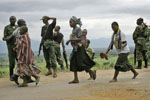
Last week, the spotlight was on eastern Congo in detailed reports by Oxfam, Human Rights Watch, and Enough.
Taken together, the Oxfam, HRW, and Enough reports – which focus, respectively but certainly with overlap, on atrocities committed by the FDLR, endemic sexual violence committed by the Congolese army, and on ending the deadly conflict in Congo– are quite complementary.
The Oxfam report, “Waking the Devil,” presented results of surveys conducted with nearly 600 people in 20 communities in the provinces of North and South Kivu. Testimony from survivors indicates that violence against civilians has sharply risen as a result of recent Congolese army offensives against the FDLR rebels embedded in communities throughout the Kivus region. But the violence is not only attributed to retaliatory attacks by the FDLR; Oxfam documented many cases of atrocities committed by Congolese soldiers. “Whole communities are brutally punished by both [the Congolese army and the FDLR] for suspected collusion with the other [armed group],” the report states.
Marcel Stoessel, the head of Oxfam in Congo, said that that more than 80 percent of people interviewed for the report said that they feel less safe than they did a year ago, when more attention was being paid to the conflict in the region. Stroessel notes:
"The war is far from over for ordinary civilians. (…) The offensive against the FDLR was supposed to bring peace to eastern Congo, but our survey shows people are living in constant fear of violent attack. This suffering is not inevitable. It is happening because world leaders have decided that collateral damage is an acceptable price to pay for removing the FDLR. But as the people we met can testify, that price is far too high.
The compact report – just over five pages chockfull of information and recommendations from the affected population – begins to quantify the magnitude of the atrocities being committed in the wake of this offensive.
Stoessel does not mince words when delivering Oxfam’s recommendations to the U.N.:
"The results of this survey should be a wake-up call to those in the UN Security Council supporting the current military offensive. (…) Many interviewees said they feared the army and the FDLR equally. The Congolese people need an army that protects on them, not preys on them. (…) The peacekeeping force should withhold support from the operation if abuses continue or go unpunished, and must insist that known human rights abusers are removed from participating in the operations."
Drawing from witness accounts and a case study on a Congolese army brigade implicated in many acts of sexual violence in North and South Kivu, Human Rights Watch spotlights the pervasiveness of sexual violence within the ranks of the Congolese army and the impunity with which the crimes are viewed. In this damning report, HRW hones in on the culpability of the Congolese army and its top commanders for the rampant sexual violence in eastern Congo today:
"Although other armed groups have also committed many brutal acts of sexual violence against women and girls, the sheer size of the Congolese army and its deployment throughout the country make it the single largest group of perpetrators. FARDC soldiers continue to commit gang rapes, rapes involving injury and death, and abductions of women and girls."
Finally, Enough’s report, “Eastern Congo: An Action Plan to End the World’s Deadliest War,” calls for a holistic approach to peacemaking in Congo, and declares that the international community’s piecemeal approach to Congo’s multi-layered and immensely complex conflict must be abandoned. The paper pinpoints and details five tasks that policymakers and activists should rally behind:
- Protecting civilians
- Implementing an effective counterinsurgency strategy against the Democratic Forces for the Liberation of Rwanda, or FDLR
- Ending the trade in conflict minerals
- Promoting regional peace and economic cooperation
- Promoting accountability
It is clear from all three of these reports that the ongoing conflict in Congo—where rape as a weapon of war is a tragic reality of daily life for many citizens—must be combated with a sustained, coordinated, and multilayered approach to address the root causes of conflict in Congo. Activists and concerned citizens must call for their governments to take resolute action to craft and implement this new approach. The atrocities occurring in Congo today demand attention. The underlying question in all three of these reports is: will you speak up and demand that your leaders do something to end the deadliest war in the world?
Maggie Fick contributed to this post.

